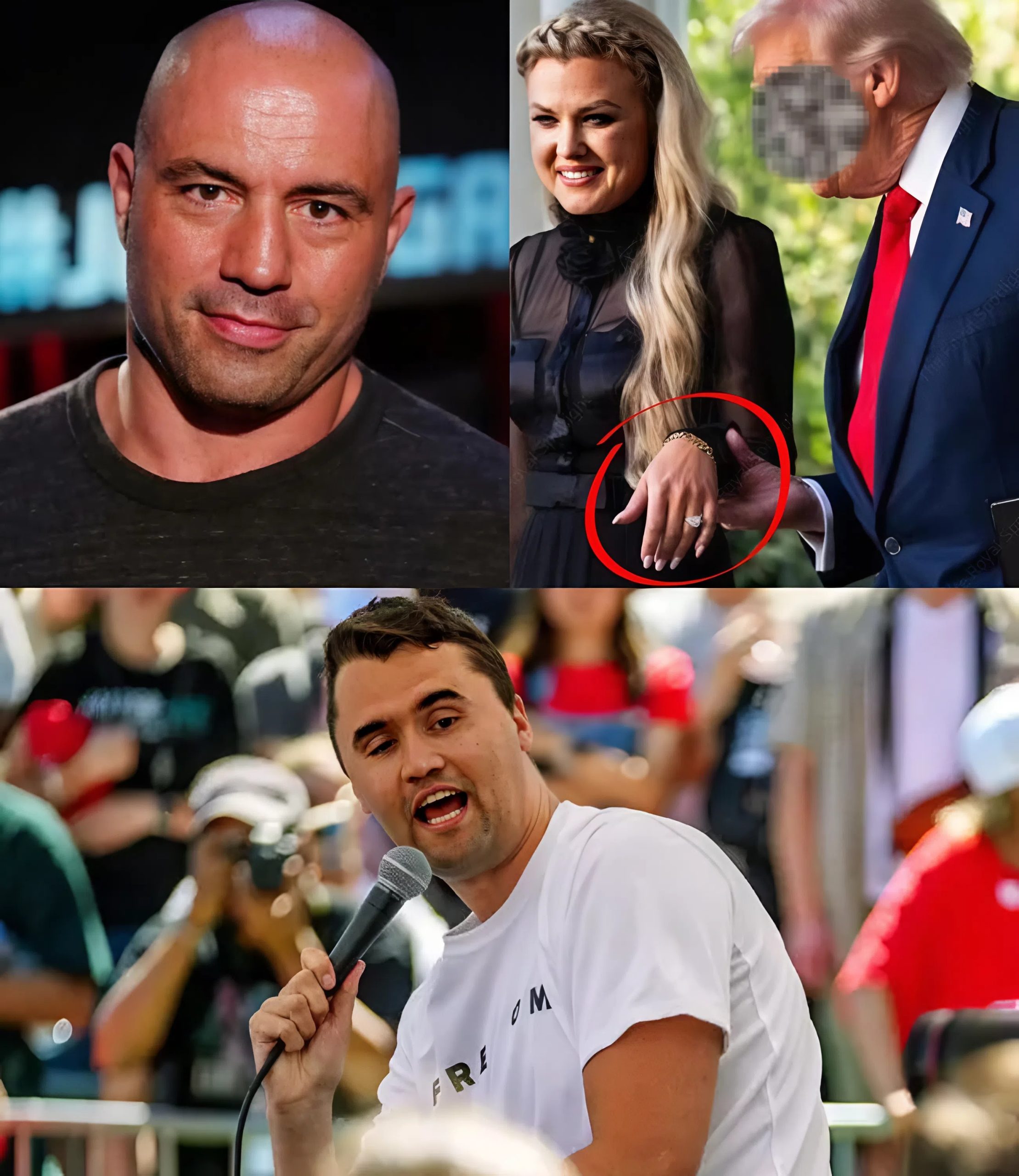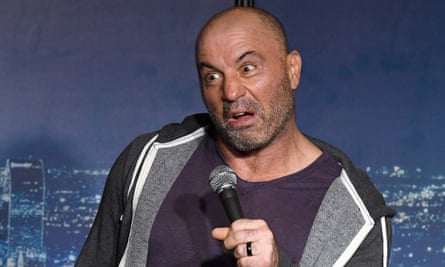In an era dominated by instantaneous social media reactions, viral outrage, and relentless 24-hour news cycles, public figures rarely find the space to address sensitive issues with nuance. Yet, in a recent episode of The Joe Rogan Experience, Joe Rogan—long known for his candid, unfiltered commentary—chose to speak publicly about a subject that has left much of the nation divided: the tragic death of political activist Charlie Kirk and, more specifically, the impact on his widow. The remarks Rogan made have shocked many, not because they were incendiary, but because they were unexpectedly compassionate, human, and deeply reflective.
The Weight of Silence
For weeks following Kirk’s death, Rogan had remained notably silent. In the digital age, where silence is often interpreted as complicity or indifference, this absence became a topic of speculation. Fans wondered whether Rogan would address the situation at all, while critics questioned the reasons behind his quietude. The anticipation built a palpable tension in media circles, creating a vacuum of commentary that was quickly filled by conjecture, memes, and heated debates.

When Rogan finally addressed the issue, the setting itself added gravity. Broadcasting from his home studio, Rogan began by acknowledging the human cost behind the headlines. “This isn’t about politics today,” he stated. “It’s about people. It’s about grief. And it’s about the responsibility we all have when we speak about those who are suffering.”
This preamble signaled a departure from his usual provocative style, alerting listeners that what followed would not be typical Rogan commentary. It was a deliberate framing, a reminder that behind every public figure lies a private life, often vulnerable and overlooked.
A Direct Appeal for Empathy
Rogan’s remarks about Charlie Kirk’s widow were particularly striking. He did not merely express condolences; he underscored the broader ethical implications of public scrutiny. “She’s navigating a loss that none of us can fully understand,” Rogan explained. “And yet, in the midst of unimaginable grief, she’s facing relentless commentary—some constructive, some cruel, much of it completely unneeded. We have to ask ourselves: what right do we have to judge or speculate?”
By centering the discussion on empathy, Rogan shifted the focus from political affiliation and partisan debate to the shared human experience of loss. His words served as both a moral critique of the online outrage culture and a subtle indictment of media platforms that amplify controversy at the expense of humanity. In doing so, Rogan highlighted a tension often ignored in public discourse: the collision between celebrity, tragedy, and ethical responsibility.

Contextualizing the Controversy
To fully grasp the significance of Rogan’s comments, one must consider the context. Charlie Kirk, founder of a prominent political organization, was a polarizing figure whose activism and public persona inspired both fervent support and harsh criticism. Following his death, discussions about his legacy quickly became entangled with personal attacks, conspiracy theories, and online speculation, often targeting his family.
In this charged environment, Rogan’s appeal for compassion was not merely a generic statement of condolence. It was a conscious intervention in a narrative dominated by judgment and sensationalism. By explicitly defending Kirk’s widow from undue scrutiny, Rogan challenged the prevailing norm that public figures’ families are fair targets for outrage.
A New Tone for Rogan
What makes this moment especially noteworthy is how it contrasts with Rogan’s established persona. Known for challenging political correctness and speaking his mind regardless of public reaction, Rogan often thrives on controversy. Yet here, he tempered his typical brashness with introspection and restraint. Instead of fueling further debate, he modeled what some commentators have called “responsible influence”—using his platform to guide discourse toward empathy rather than division.
This tonal shift did not go unnoticed. Media analysts observed that Rogan’s comments might signal an evolution in his public engagement: a recognition that influence carries ethical obligations, particularly when personal tragedy intersects with public scrutiny. It also highlighted an often-overlooked truth in modern media: restraint can be just as powerful as provocation.
Public and Critical Response
The immediate reaction to Rogan’s statements was a mix of admiration and skepticism. Social media erupted with praise from fans who saw the remarks as a refreshing call for decency in a climate often dominated by outrage. Some viewers lauded the unusual depth of Rogan’s empathy, remarking that it revealed a previously hidden dimension of his personality—one capable of reflection and moral consideration.

Critics, however, questioned the timing and intent of his comments. Why had Rogan waited so long? Were the remarks strategically calculated to maintain relevance in a crowded media landscape? Even among those skeptical of his motives, there was general consensus that the content of his statement—centered on human dignity and respect—resonated in ways that transcended partisan debate.
The Ethical Dimensions
Rogan’s intervention touches on broader ethical questions about public commentary. In today’s media ecosystem, outrage often outweighs empathy, and viral moments can eclipse nuanced understanding. By explicitly advocating for compassion, Rogan positioned himself as a counterweight to the sensationalist tendencies of modern discourse.
Dr. Allison Kendrick, a media ethics scholar at Northwestern University, noted: “Rogan’s statement is significant because it confronts a systemic issue. He’s not just offering condolences—he’s challenging the cultural expectation that grief must be commodified and politicized. It’s rare for influential voices to take a step back and assert this perspective.”
The underlying message is clear: even in an environment where clicks and views dominate, there exists the possibility of discourse grounded in humanity.
Lessons in Grief and Public Responsibility
Beyond its ethical implications, Rogan’s commentary offers a lesson in how society should approach grief. Public tragedies often invite commentary that is either performative or exploitative, reducing complex human experiences to soundbites. Rogan’s approach, emphasizing restraint, context, and empathy, reminds audiences that behind every public story lies a network of private lives profoundly affected.
By acknowledging the widow’s suffering while maintaining focus on shared human values, Rogan highlighted a rarely addressed truth: grief should not be weaponized for social or political gain. In doing so, he also subtly critiqued the culture of social media outrage, where quick reactions often overshadow reflective thought.
The Ripple Effect
The ramifications of Rogan’s statements are still unfolding. Media outlets have dissected every phrase, while commentators debate whether this moment marks a turning point in Rogan’s public persona. For the public, it has sparked conversations about civility, empathy, and the moral responsibility that comes with influence. In a society increasingly polarized by politics and ideology, such interventions are not only rare but necessary.

Some analysts suggest that Rogan’s remarks could set a precedent, encouraging other public figures to address tragedy with the same combination of honesty and compassion. It is a subtle yet powerful form of leadership: influencing discourse not through sensationalism but through a reminder of shared humanity.
Conclusion: Humanity in the Digital Age
Joe Rogan’s decision to speak about Charlie Kirk’s widow may appear, at first glance, as a simple gesture of sympathy. Yet, upon closer examination, it reveals a deep engagement with the ethical complexities of modern media and public life. In highlighting empathy over outrage, Rogan has reframed the conversation, reminding audiences that behind every headline is a person enduring profound pain.
In the digital age, where words travel faster than understanding, Rogan’s intervention stands as a testament to the power of thoughtful communication. It challenges both media creators and consumers to pause, reflect, and consider the human impact of their commentary. More than that, it demonstrates that even in the most polarized environments, moments of moral clarity are possible—and profoundly necessary.
As discussions about Charlie Kirk’s legacy continue, Rogan’s words serve as a rare reminder: in a world obsessed with conflict and spectacle, the quiet advocacy for respect, dignity, and empathy can resonate louder than the loudest outrage. And in doing so, it leaves a mark not just on the discourse surrounding Kirk’s death, but on the broader cultural conversation about grief, media, and the responsibility of influence.
